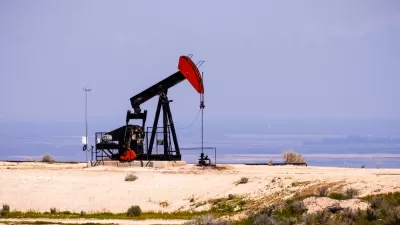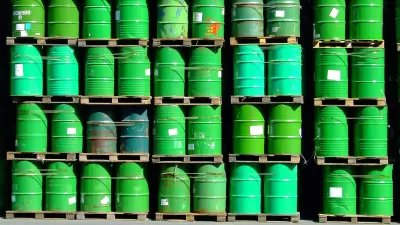The world's third cheapest gasoline will increase by 40 percent in order to deal with a record budget deficit of $98 billion this year. Plummeting oil prices have forced the world's largest oil exporter, Saudi Arabia, to reduce energy subsidies.
Major change is coming to Saudi Arabia. No, I'm not talking about allowing women to drive. This change will have beneficial environmental and economic consequences, though it remains to be seen how motorists will take it.
A world awash in cheap oil has been able to do what the International Monetary Fund (IMF) has unsuccessfully been advising them and other oil exporters to do for years: remove energy subsidies to reduce energy consumption and greenhouse gas emissions.
In a February post on reducing energy subsidies, it was noted that "Saudi Arabia, Russia and Venezuela — three of the most heavily subsidized countries — have done little or nothing to reform," wrote Clifford Krauss for The New York Times.
Income from oil "accounts for over 90 percent of public revenues" in Saudi Arabia according to Deutsche Welle (DW) News. So when oil prices fall, so does income to the national budget.
"The budget deficit has been the highest in the history of Saudi Arabia, which is currently the world's largest oil exporter," reports Agence France-Presse (AFP) via Press TV.
It was the second deficit year in a row for Saudi Arabia and Riyadh [capital city] is expected to announce another shortfall when it unveils its 2016 budget later on Monday [Dec. 28].
But the big news is not the size of Saudi Arabia's deficit. After all, in February, The Washington Post reported that it had $750 billion in cash reserves to deal with these deficits. It's the measures the Saudi leaders are resorting to deal reduced revenue.
Budgetary pressure is forcing Saudi Arabia to review the prices of heavily-subsidized electricity and fuel in the country in what has been seen as part of Riyadh’s new measures to cope with low oil prices.
Saudi Arabia’s official Saudi Press Agency on Monday reported that Riyadh has decided to raise gasoline prices by more than 50 percent for some products [on] Tuesday as it cuts a range of subsidies.
Prices will also increase for electricity, water, diesel and kerosene under the cuts approved by the council of ministers, which is headed by Saudi Arabia’s King Salman.
Al Jazeera reports that the policy change would result in a 40 percent in gas prices at the pump.
In order to address the situation, the Gulf kingdom has set the price of 95 octane gasoline at 0.90 riyals ($0.24) per litre up from 0.60 riyals per litre - a hike of 40 percent. The price increase takes effect on Tuesday, the official SPA news agency said on its Twitter account.
A price of $.24 per liter equals $.908 a gallon. Gas prices on Dec. 21, according to GlobalPetrolPrices.com, were $.15 per liter, the third lowest in the world after Venezuela and Libya.
Returning to the size of the budget deficit announced by SPA on Monday, Russia's news agency, Sputnik, took a swipe at their chief oil export competitor, one they no doubt blame for the fall in prices stemming from an OPEC meeting last year in a Nov. 21 article, "Oil Reliance Policy Dragging Saudi Arabia to the Brink of Economic Collapse."
While Sputnik failed to mention the contraction in the Russian economy due to low oil prices, it did note a recent IMF report calling on Saudi Arabia to diversify its economy to become less oil dependent. However, as noted above, the IMF has also called on Russia to reduce its energy subsidies, which Saudi Arabia has now chosen to do. Will Russia follow, or, for that matter, the U.S?
FULL STORY: Saudi posts record $98 bn deficit in 2015

Planetizen Federal Action Tracker
A weekly monitor of how Trump’s orders and actions are impacting planners and planning in America.

Maui's Vacation Rental Debate Turns Ugly
Verbal attacks, misinformation campaigns and fistfights plague a high-stakes debate to convert thousands of vacation rentals into long-term housing.

San Francisco Suspends Traffic Calming Amidst Record Deaths
Citing “a challenging fiscal landscape,” the city will cease the program on the heels of 42 traffic deaths, including 24 pedestrians.

Defunct Pittsburgh Power Plant to Become Residential Tower
A decommissioned steam heat plant will be redeveloped into almost 100 affordable housing units.

Trump Prompts Restructuring of Transportation Research Board in “Unprecedented Overreach”
The TRB has eliminated more than half of its committees including those focused on climate, equity, and cities.

Amtrak Rolls Out New Orleans to Alabama “Mardi Gras” Train
The new service will operate morning and evening departures between Mobile and New Orleans.
Urban Design for Planners 1: Software Tools
This six-course series explores essential urban design concepts using open source software and equips planners with the tools they need to participate fully in the urban design process.
Planning for Universal Design
Learn the tools for implementing Universal Design in planning regulations.
Heyer Gruel & Associates PA
JM Goldson LLC
Custer County Colorado
City of Camden Redevelopment Agency
City of Astoria
Transportation Research & Education Center (TREC) at Portland State University
Jefferson Parish Government
Camden Redevelopment Agency
City of Claremont





























